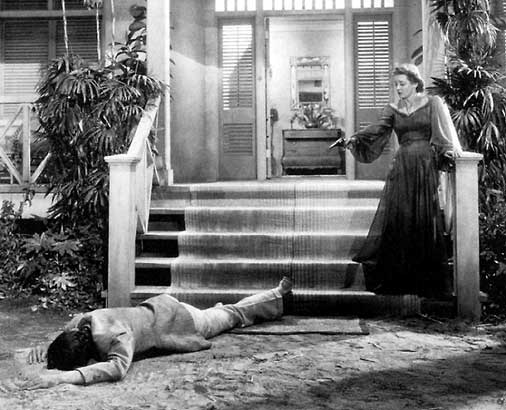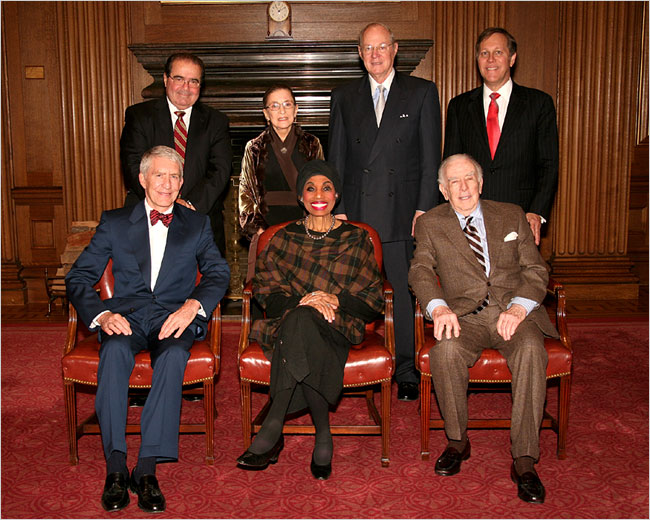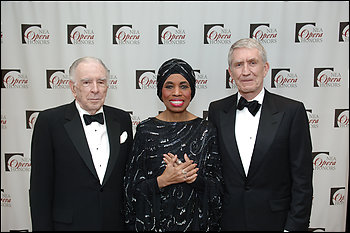“Democracy is the theory that the common people know what they want, and deserve to get it good and hard.”
H.L. Mencken, A Little Book in C Major
Archives for November 2008
DVD
Budd Boetticher: The Collector’s Choice (Sony, five discs). At long last, the five Budd Boetticher-Randolph Scott Westerns made between 1957 and 1960 have made it to DVD. (Seven Men From Now, the first film in the series, was released in 2005.) Three of these stark, laconic moral tales, The Tall T, Ride Lonesome, and Comanche Station, rank high on the short list of great postwar Westerns, while Decision at Sundown and Buchanan Rides Alone, though not in the same league, are definitely worth seeing. Also included is A Man Can Do That, Bruce Ricker’s Boetticher documentary. Essential viewing for film buffs (TT).
TT: By the clock
One of the other things I did during last week’s trip to Washington, D.C., was attend a reception for Richard Gaddes, the Santa Fe Opera’s recently retired general director, who was in town to receive an NEA Opera Honor. I chatted with several members of the Santa Fe Opera board about The Letter, which Richard commissioned. All were amazed and delighted when I told them that The Letter is only ninety minutes long. One of the men to whom I spoke didn’t know that our opera is based on the same Somerset Maugham play that William Wyler filmed in 1940. “A Bette Davis opera?” he said. “And it’s only an hour and a half long? You can’t miss!”
Needless to say, there’s no such thing as a can’t-miss opera, but I knew what he meant, as well I should have: we planned it that way, right from the start.
In August of 2006, a few days after I first suggested that Paul Moravec, my collaborator-to-be, read “The Letter,” the short story that Maugham later adapted for the stage, with an eye to turning it into an opera, Paul wrote back to me as follows:
First impression: top-drawer, rattling good stuff, ripping yarn. I see it as a 90-minute, no-intermission opera (à la Wozzeck).
Later that day he sent me a second e-mail:
Further ramblings on why an opera plot should just go as inevitably and irresistably as a locomotive: in the absence of such a plot, it seems that the composer has to work too hard just to make his music overcome natural inertia. Dramatic music requires the vehicle of such a plot to ride on and through from beginning to end. It involves the nature of time itself: if the time-sense is thick and viscous and boring, so is the effect of the music, no matter how brilliant it may be. As the time-sense of the narrative goes, so goes the time-sense of the music. It is a deeply poetic medium, not at all prosaic, and, for example, the dragging effect of too much detailed prosaic exposition, too much contemplative commentary, too much character elaboration, etc., is just death.
 By then it was already clear that we were thinking along the same lines, if from slightly different angles: Paul was thinking like a poet, I like a craftsman. (That sums us both up pretty well.)
By then it was already clear that we were thinking along the same lines, if from slightly different angles: Paul was thinking like a poet, I like a craftsman. (That sums us both up pretty well.)
The next day I replied:
Here’s the opening: house to black. The orchestra plays three or four Tosca-like prefatory chords. Then, in total silence, we hear six gunshots in the darkness. Lights up fast on Leslie standing over the dead body of her lover, holding a smoking revolver.
BOOOOOOOM!! Is that an opera, or what?
And yes, you’re totally right—the model is Wozzeck and it should play without an intermission.
Within a few days I’d refined the opening gambit—the gunshots now came first, followed by the music—and shortly thereafter the two of us started talking face to face and in detail about we wanted to do.
Three months later we sent an outline of The Letter to Richard Gaddes, accompanied by a letter in which we jointly explained what we had in mind:
We see The Letter as a cross between a musical film noir and a verismo opera, smaller in physical scale than Tosca but similar in weight and intensity. We want it to feel like a movie, which is why we plan for it to run roughly ninety minutes without an intermission, with orchestral interludes bridging the scene breaks. Our goal is to write an opera whose casting and scenic requirements are compatible with the needs of medium-sized regional houses but which is musically “big” enough to work just as well in large houses.
Ten days after that, Gaddes sent us the simplest and most thrilling of replies: “We are planning to proceed with the commission of The Letter for 2009.”
 What this correspondence makes clear is that from the very outset of our collaboration, we knew exactly what kind of opera we wanted to write. In addition to Tosca, Paul had in mind Alban Berg’s Wozzeck, while I was thinking more of Richard Strauss’ Salome, Benjamin Britten’s The Turn of the Screw, and Gian Carlo Menotti’s The Medium, but all of these works are concise, fast-moving, and melodramatic in the best sense of the word.
What this correspondence makes clear is that from the very outset of our collaboration, we knew exactly what kind of opera we wanted to write. In addition to Tosca, Paul had in mind Alban Berg’s Wozzeck, while I was thinking more of Richard Strauss’ Salome, Benjamin Britten’s The Turn of the Screw, and Gian Carlo Menotti’s The Medium, but all of these works are concise, fast-moving, and melodramatic in the best sense of the word.
At the same time, the initial conception of The Letter was influenced as much by cinematic models as by operatic ones. We had talked early on about the possibility of writing a Raymond Chandler opera, and Paul also suggested that Casablanca would make a perfect libretto. I nipped those ideas in the bud, knowing that we could never get the rights to adapt Casablanca or any of the Chandler novels that have been filmed (i.e., most of them). But the idea of writing a film-noir opera was still very much in our minds when I suggested “The Letter” to Paul.
That’s why we decided to stick with Paul’s initial impulse and write a ninety-minute opera with no intermission.
No doubt certain spinach-pushing critics will jump from there to the conclusion that The Letter is unserious, but that’s their problem, not ours. Paul and I believe that it’s possible for an opera to be both popular and serious, like Tosca or Salome or Rigoletto. Or Sweeney Todd, for that matter.
In the ever-relevant words of Louis Armstrong, “Showmanship does not mean you’re not serious.” We’re dead serious—but The Letter is still a show.
TT: Almanac
“The people reign over the American political world as God rules over the universe. It is the cause and the end of all things; everything rises out of it and is absorbed back into it.”
Alexis de Tocqueville, Democracy in America
TT: Among the brethren
I hear there’s an election tomorrow, but I’ve been too busy to think much about it. As I mentioned last week, I just got back from spending three days in Washington, D.C., where I attended a meeting of the National Council on the Arts, and no sooner did I return to New York than I took in two off-Broadway shows, Black Watch and Romantic Poetry. That’s my life, and I shouldn’t ever complain about it, though sometimes I do. But I couldn’t come up with a single thing in the world to grouse about last Friday, for I spent the afternoon lunching at the Supreme Court Building with Associate Justices Ruth Bader Ginsburg, Anthony Kennedy, and Antonin Scalia, along with three of the four winners of the first NEA Opera Honors, one of whom is none other than Leontyne Price.
 I was on hand to introduce another of the honorees, Richard Gaddes (front row, left) of the Santa Fe Opera, to the assembled luminaries, of whom there were plenty. Dana Gioia, the outgoing chairman of the National Endowment for the Arts, shared ceremonial duties with Justice Ginsburg. Carlisle Floyd, the composer of Susannah and Of Mice and Men and another of the honorees, was introduced by William Bolcom, the composer of A View from the Bridge and the husband and recital partner of Joan Morris. (James Levine, the fourth honoree, was stuck in New York, rehearsing the Metropolitan Opera in The Damnation of Faust.) The handsome conference room in which we dined was packed with opera-loving Washington types and lined with formal portraits of the court’s previous chief justices. It was, in short, quite a party.
I was on hand to introduce another of the honorees, Richard Gaddes (front row, left) of the Santa Fe Opera, to the assembled luminaries, of whom there were plenty. Dana Gioia, the outgoing chairman of the National Endowment for the Arts, shared ceremonial duties with Justice Ginsburg. Carlisle Floyd, the composer of Susannah and Of Mice and Men and another of the honorees, was introduced by William Bolcom, the composer of A View from the Bridge and the husband and recital partner of Joan Morris. (James Levine, the fourth honoree, was stuck in New York, rehearsing the Metropolitan Opera in The Damnation of Faust.) The handsome conference room in which we dined was packed with opera-loving Washington types and lined with formal portraits of the court’s previous chief justices. It was, in short, quite a party.
In the crowd was my colleague Tony Tommasini of the New York Times, who was scurrying around the room with pencil and pad in hand. “You’re not working today, are you?” I asked. He nodded ruefully. “Not me,” I said with a smile. “I’ve got the day off–or, rather, I’m wearing a different hat.”
I knew in a general way that the three Supreme Court justices hosting the luncheon were opera buffs, but not until Friday did I learn just how buffy they are. Justice Ginsburg, it turns out, is both a devoted operagoer and–brace yourself–a longtime fan of the Santa Fe Opera. “Once I discovered the Santa Fe Opera, I stopped going to Salzburg and Glyndebourne,” she said in her welcoming address, a witty and exceedingly learned talk on lawyers in opera in which she pointed out that (A) there aren’t many of them and (B) they’re mostly crooked. Nor are Justices Kennedy and Scalia far behind her in their enthusiasm for the art form of which I have lately become a part-time practitioner.
The Sunrise String Quartet supplied appropriate background music as we all ate our chicken piccata, playing instrumental arrangements of popular arias. My chair faced away from them, but I half-noticed midway through the meal that they’d struck up “Un bel di vedremo,” the best-known aria from Puccini’s Madama Butterfly. Then I heard a smoky soprano voice singing along softly but beautifully, floating Puccini’s high notes with perfect poise. A ripple of excitement fluttered through the room. I turned around and saw Leontyne Price singing the aria from her seat, sounding not like an octogenarian retiree but like…well, Leontyne Price. We all clapped and cheered wildly when she was done. “Once a diva, always a diva,” I whispered to the ambassador on my right, wiping a tear from my eye with my napkin.
 After lunch came the introductions of the honorees. I had hastily scribbled an additional improvised line into my speech during Justice Ginsburg’s remarks, and I wondered as I walked to the podium whether it was appropriate to the occasion. I looked out at the audience and realized, much to my surprise, that I was more than a little bit nervous. I took a deep breath and started talking:
After lunch came the introductions of the honorees. I had hastily scribbled an additional improvised line into my speech during Justice Ginsburg’s remarks, and I wondered as I walked to the podium whether it was appropriate to the occasion. I looked out at the audience and realized, much to my surprise, that I was more than a little bit nervous. I took a deep breath and started talking:
The word “great” is not often used to decribe impresarios, but it is the right word for Richard Gaddes. He has led not one but two major opera companies, the Opera Theatre of St. Louis, which he founded, and the Santa Fe Opera, from which he stepped down at the end of this season.
In St. Louis he invited Louise Nevelson to design her first stage set, gave Jonathan Miller his American directing debut, and launched the careers of Jerry Hadley, Thomas Hampson, Susanne Mentzer, Sylvia McNair, and Vinson Cole. In Santa Fe he devoted himself no less assiduously to cultivating the careers of promising young artists, overseeing one of America’s first and foremost professional development and training programs. In both cities he programmed a long and impressive string of operas old and new.
I have personal reason to know of Richard’s commitment to new opera, for he commissioned Paul Moravec and me to write our first opera, The Letter, which will be premiered next July at Santa Fe.
I looked up from my text and caught Justice Ginsburg’s eye before reading the line that I’d added a few minutes earlier:
One of the principal characters is a lawyer!
The room was dead silent for a split-second. Then Justice Ginsburg started laughing, and so did everyone else. I grinned and went back to my prepared text:
I hope that our opera will uphold Richard’s hard-earned, well-deserved reputation as an impresario of taste, elegance, adventure, and wisdom, for all of which he will always be remembered throughout the world of music.
Afterward I made a beeline for Justice Ginsburg’s table and invited her to come to the opening night of The Letter. “Of course I’ll be there, and so will my husband,” she replied. By then Justice Scalia had already vanished into the crowd, but I was introduced a moment later to Justice Kennedy, who told me an anecdote about a family of Chinese classical musicians who had miraculously managed to survive the Cultural Revolution. I turned to the woman next to me when we were finished talking and saw that she was Leontyne Price.
“I’ll never forget the sound of your voice today,” I said, doing my best to keep my own voice under control.
“Well,” she replied, “I wanted to show everybody that I could still sing a bit, even though I’m eighty years old!” And all at once I was embracing her.
The ceremony had run overtime and I had to leave for New York at once, so I said a hasty but heartfelt farewell to Richard Gaddes, ran down the marble steps of the Supreme Court Building, and caught a cab that rushed me to Union Station. As I galloped through the front door, I nearly knocked down a heedless tourist who was talking on his cellphone. “We just got to Washington,” he told the person on the other end of the line. “I wonder if we’ll see anyone famous?”
You just might, friend, I said to myself. You just might.
* * *
Anthony Tommasini’s New York Times report on Friday’s ceremony is here.
TT: On the air
If you’re in or near Cleveland, I’ll be on the radio today, appearing on WCPN’s Around Noon to talk about my recent visits to the Great Lakes Theater Festival and the Cleveland Play House. The show starts at noon ET, and my segment is scheduled to get under way at roughly 12:25. Tune in 90.3 on your FM dial to listen.
For more information, or to listen to Around Noon on line, go here.
TT: Points taken
We don’t do politics at “About Last Night,” but given the general interest in the outcome of tomorrow’s vote, I selected five widely varied quotes about democracy to serve as this week’s almanac entries. As always, they may or may not reflect the opinions of one or more of the three people who blog in this space, but we ain’t tellin’, so don’t ask us.
TT: Almanac
“To acquire immunity to eloquence is of the utmost importance to the citizens of a democracy.”
Bertrand Russell, Power
